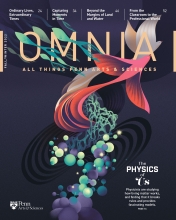Organic Learning
A message from editor Blake Cole
As we head into the holiday season, we are excited to again deliver OMNIA in printed form. One focus of this issue is connection with nature. In our cover story, “The Physics of Us,” we explore how living matter works—whether it’s the vasculature in leaves or the neurons in our brains—and find that it breaks standard rules and produces fascinating phenomena that could impact everything from medicine to robotics.
Our focus on nature also includes an examination of issues surrounding climate change, a central priority for the School. “Beyond the Margins of Land and Water” follows two interdisciplinary research initiatives that provide insight on worldwide climate disasters and water crises, analyzing everything from melting glaciers to intensifying monsoon cloud bursts. “Tree Wisdom” profiles a new book that examines 5,000 years of living trees through the lens of science, religion, and history, as well as the long-term relationships between people and individual trees. And in our Last Look visual feature, a postdoctoral researcher collects coral samples to study how ocean acidification—caused by rising CO₂ levels—is affecting the health of reefs.
Though the election season will be behind us by the time you read this, concerns over the economy and global affairs will certainly remain. In “OMNIA 101: The Federal Reserve Bank,” we speak with a former Fed employee turned professor to learn more about why the institution is especially relevant in times of financial crisis. We also learn how a fateful trip to Eastern Europe in 1989 inspired a professor to pursue a career studying the impact of the Cold War and its aftermath on the lives of individuals in “Ordinary Lives, Extraordinary Times,” and how the Department of Russian and East European Studies is helping to bring Ukrainian scholars to Penn.
One of the strengths of Penn Arts & Sciences learning is the diverse classroom experiences our students share. With this in mind, our In the Classroom segment explores the “flipped classroom,” a learning model in which lectures and presentations are delivered outside of class time while in-person learning features active student engagement. “Moments in Time” tells the story of a long-form nonfiction class that met over dinner, following two students as they create detailed portraits of life around campus, while “Threading the Needle” highlights an initiative in the College of Liberal and Professional Studies’ online Bachelor’s of Applied Arts and Sciences degree program that guides students in curating a digital collection of materials to showcase their academic abilities. This portfolio has helped graduates build their careers, including a professional ballerina who parlayed her new-found confidence into a leadership role at her ballet company.
In our Movers & Quakers alumni profile, we speak with Victor Scotti, C’13, who is harnessing technology to work towards a future where diversity, equity, and inclusion are the norm. Scotti also operates his own company, which “accelerates Black boys’ self-efficacy” through professional experiences, job shadowing, mentorship, and socio-emotional support.
A number of programs in the Penn Arts & Sciences community recently celebrated anniversaries, among them Kelly Writers House, the Center for the Advanced Study of India and its counterpart in New Delhi, the University of Pennsylvania Institute for the Advanced Study of India, and the Barbara and Edward Netter Center for Community Partnerships. In “Celebrating the Past—and Planning for the Future” we explore how these initiatives’ combined 110 years of experience, research, education, and collaboration continue to have enormous impact at Penn and in the world.
We also share in the campus-wide welcome of Elizabeth Magill, the new President of the University of Pennsylvania. Magill recently met with Penn Arts & Sciences faculty, students, and staff to learn about highlights and priorities across the School.
We hope you enjoy all the issue has to offer. Happy holidays.



